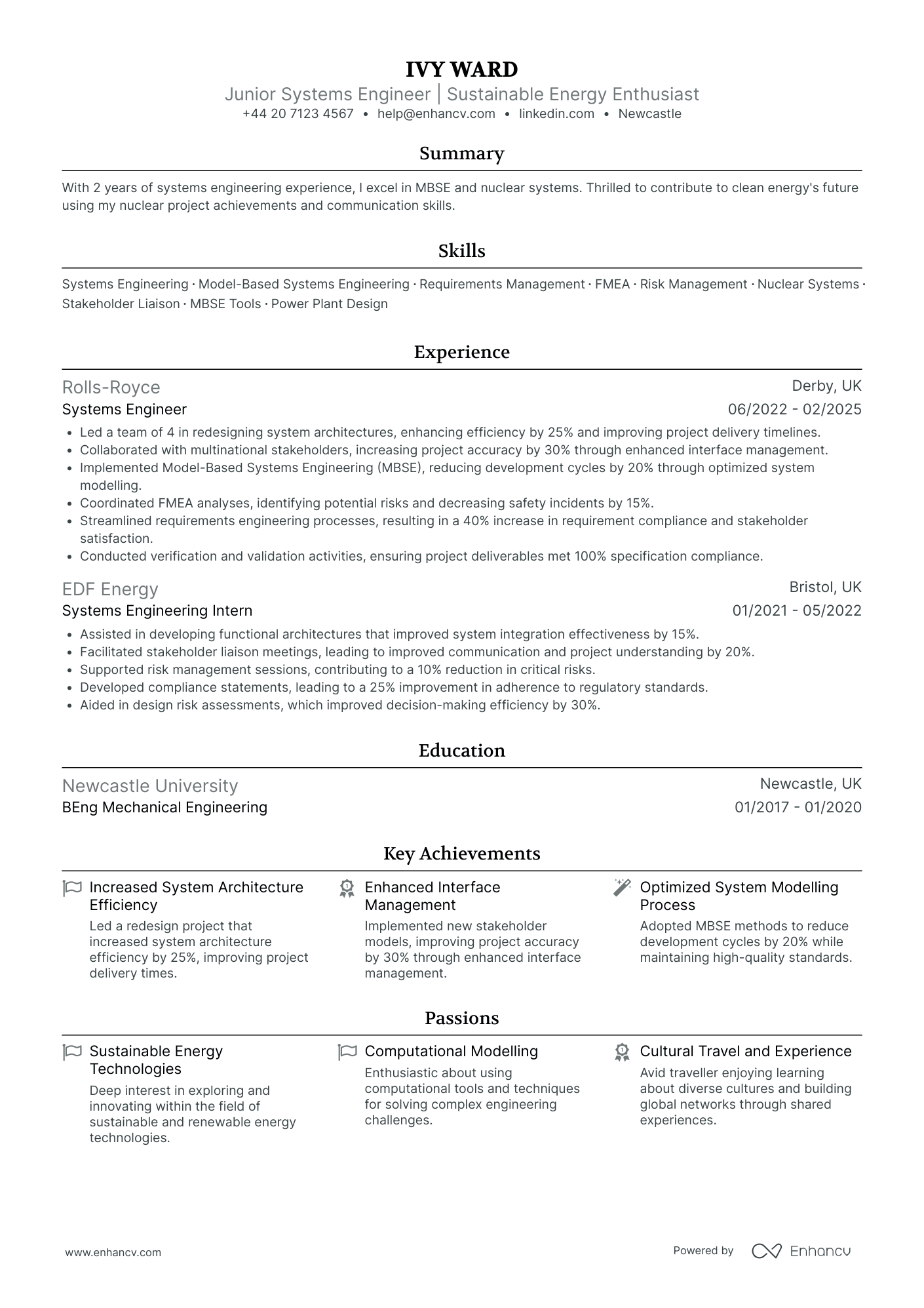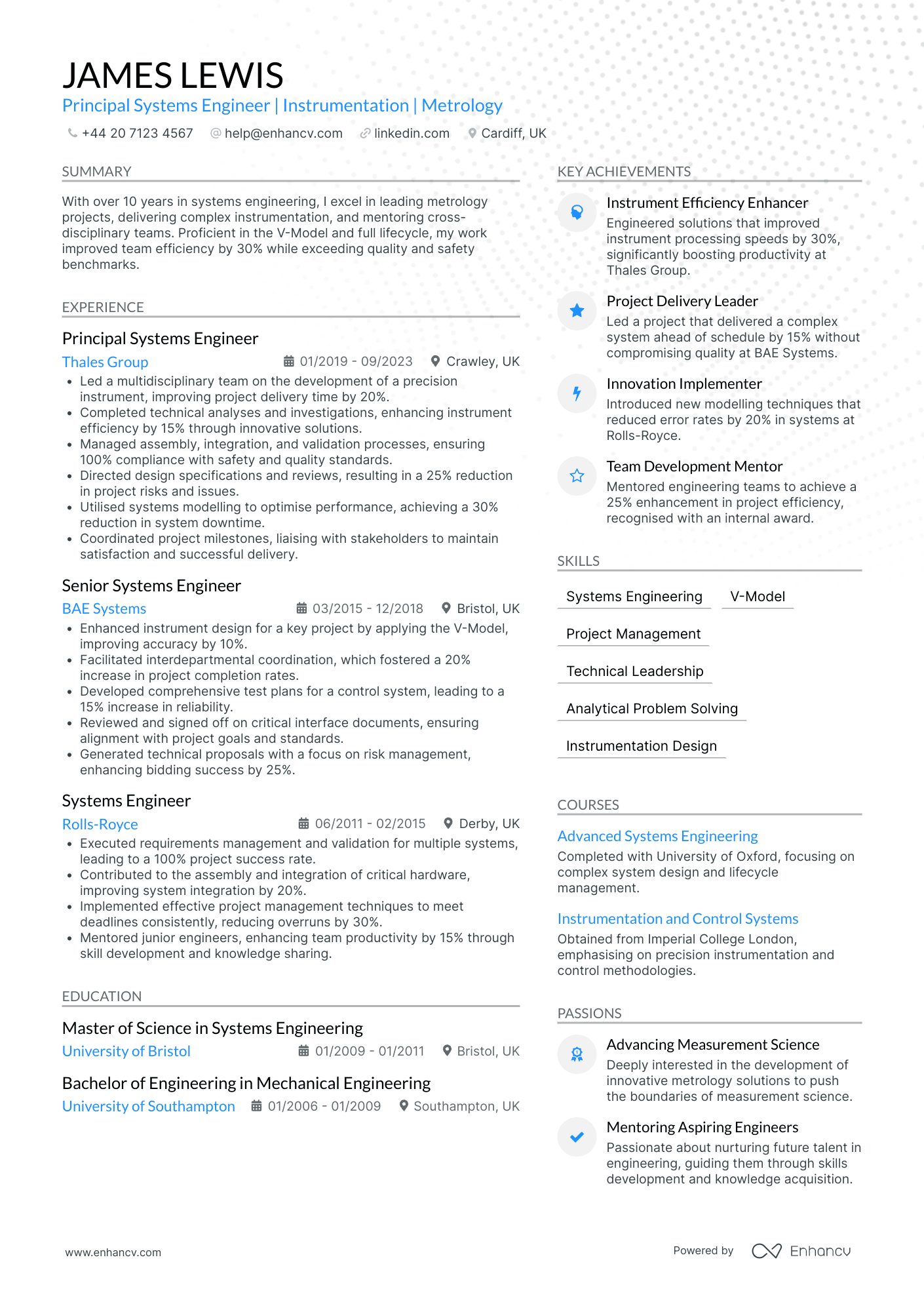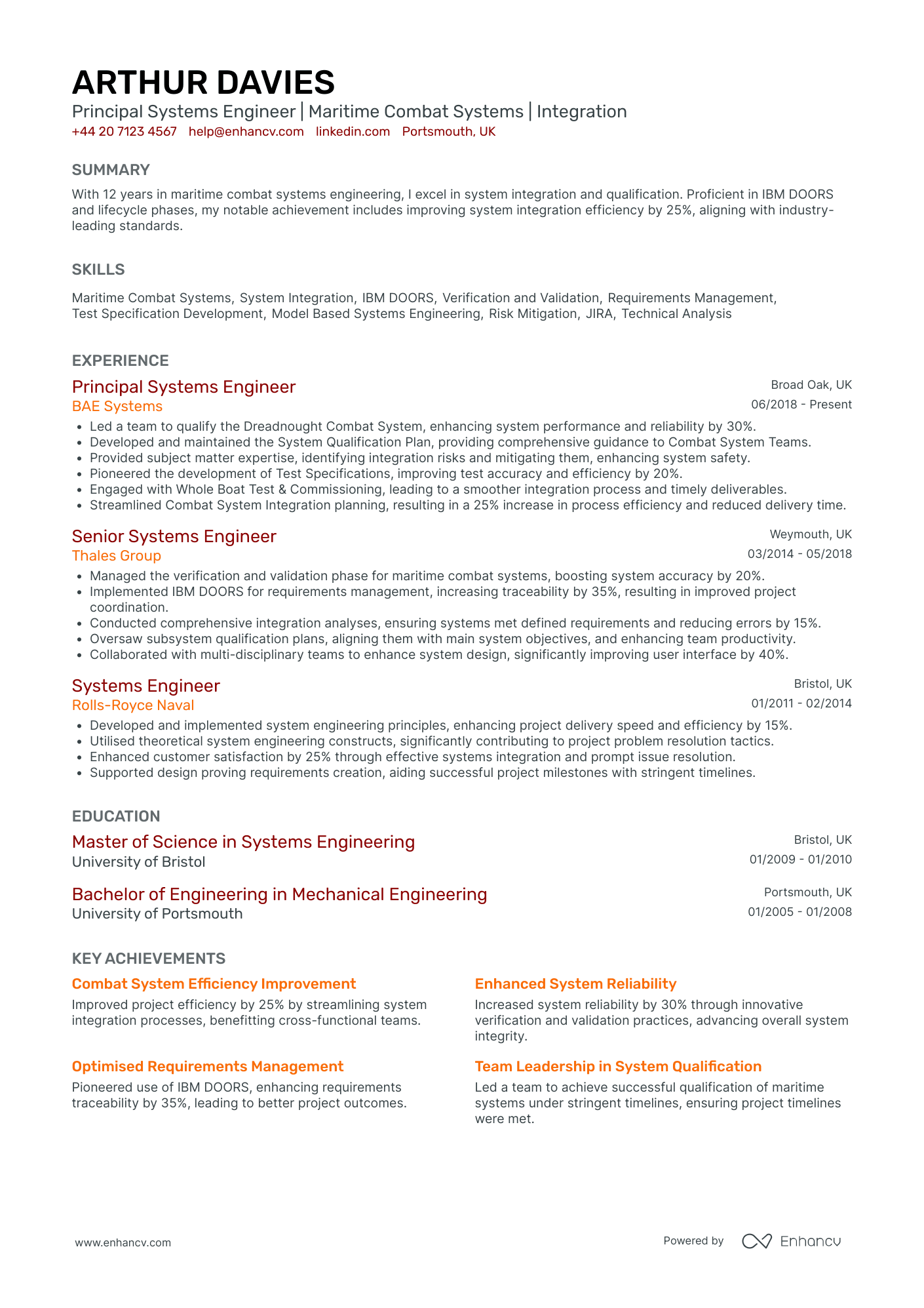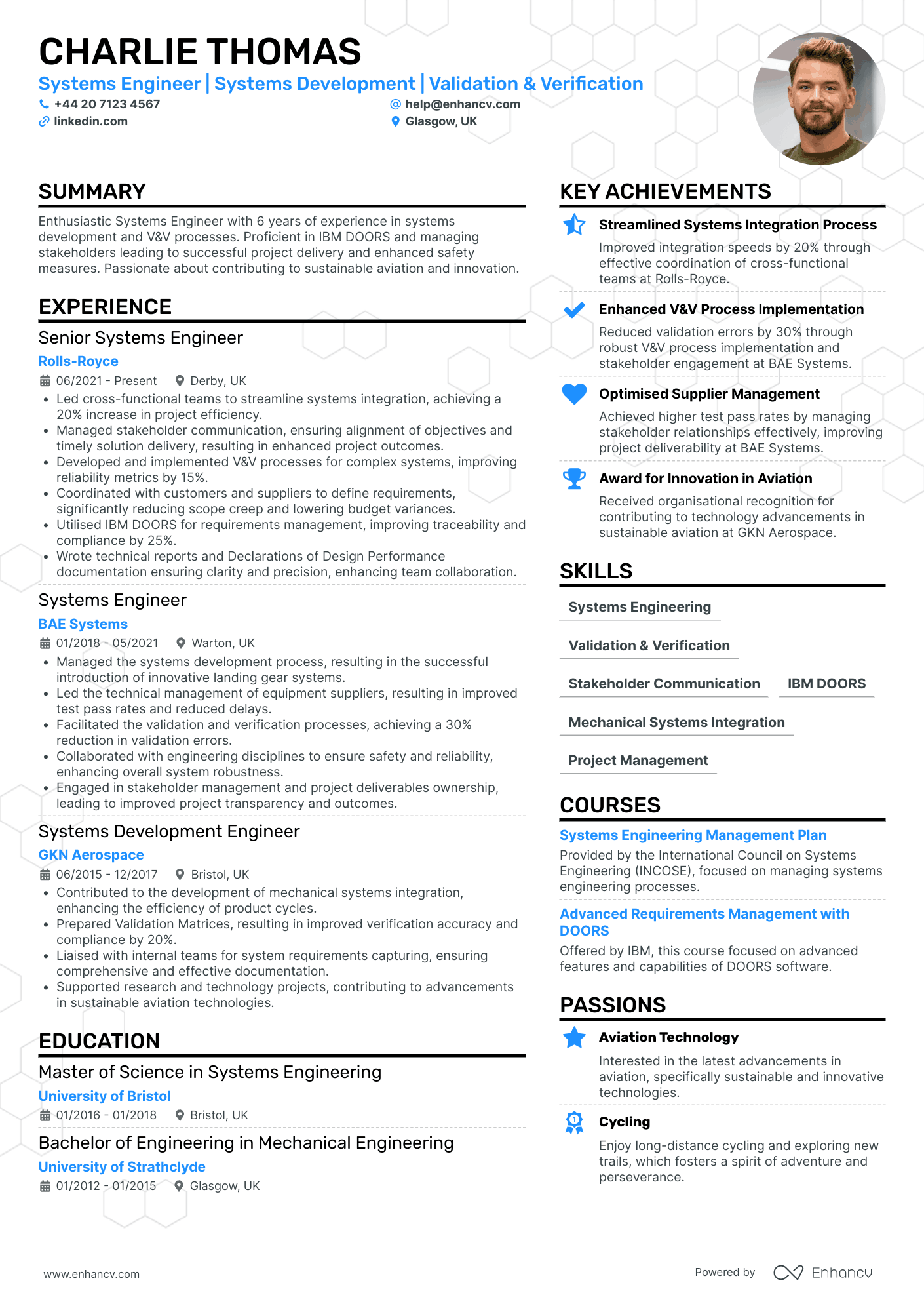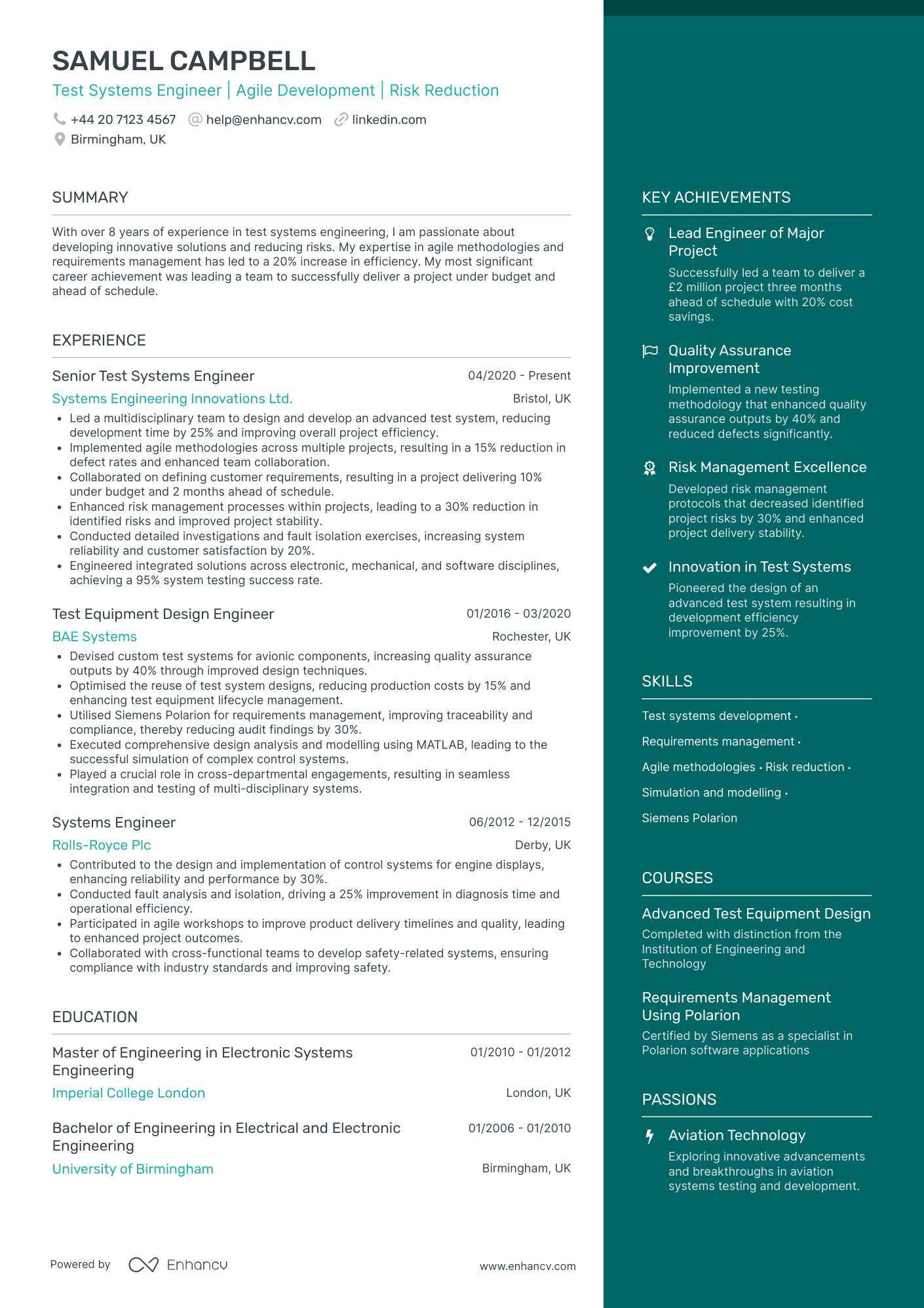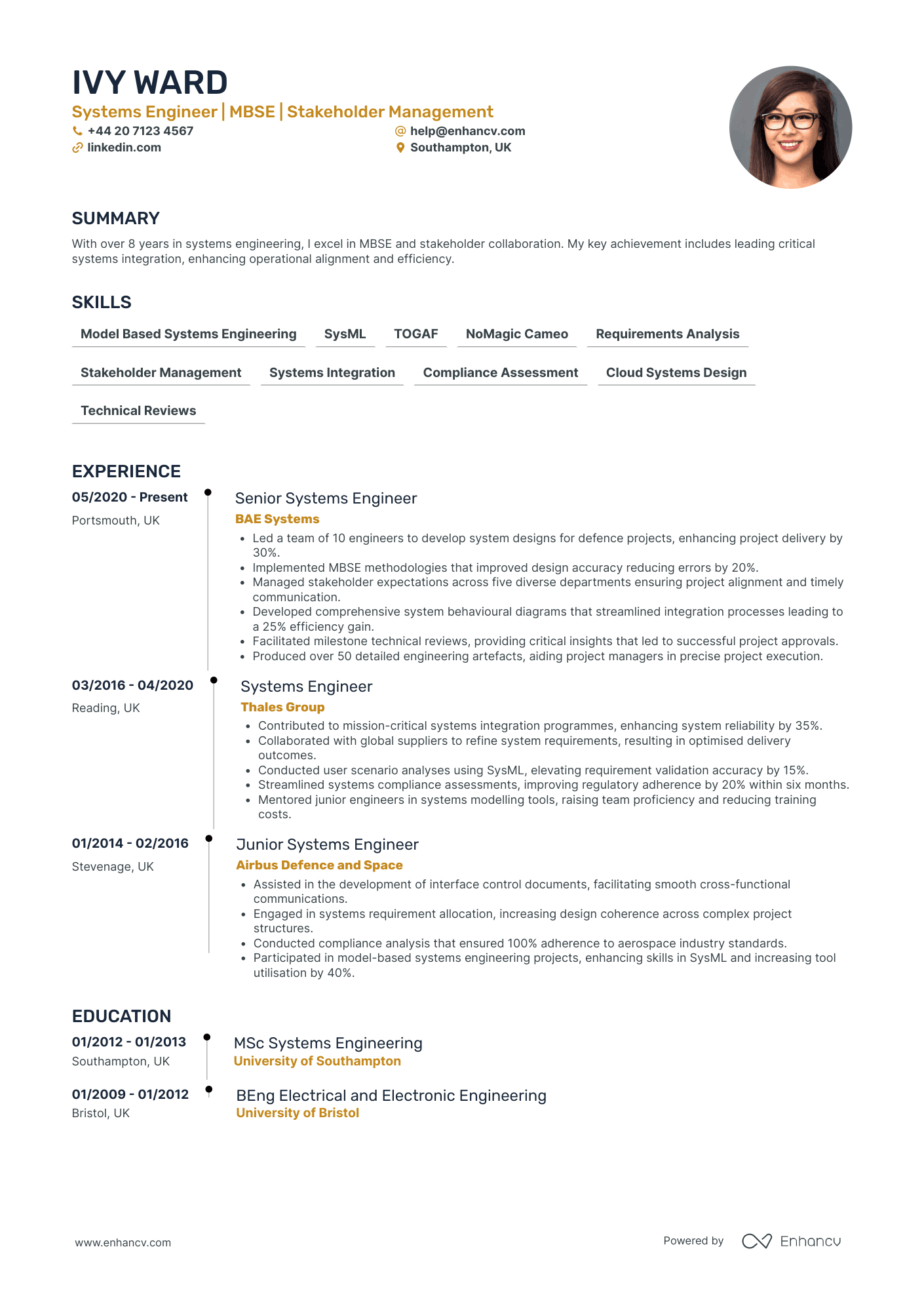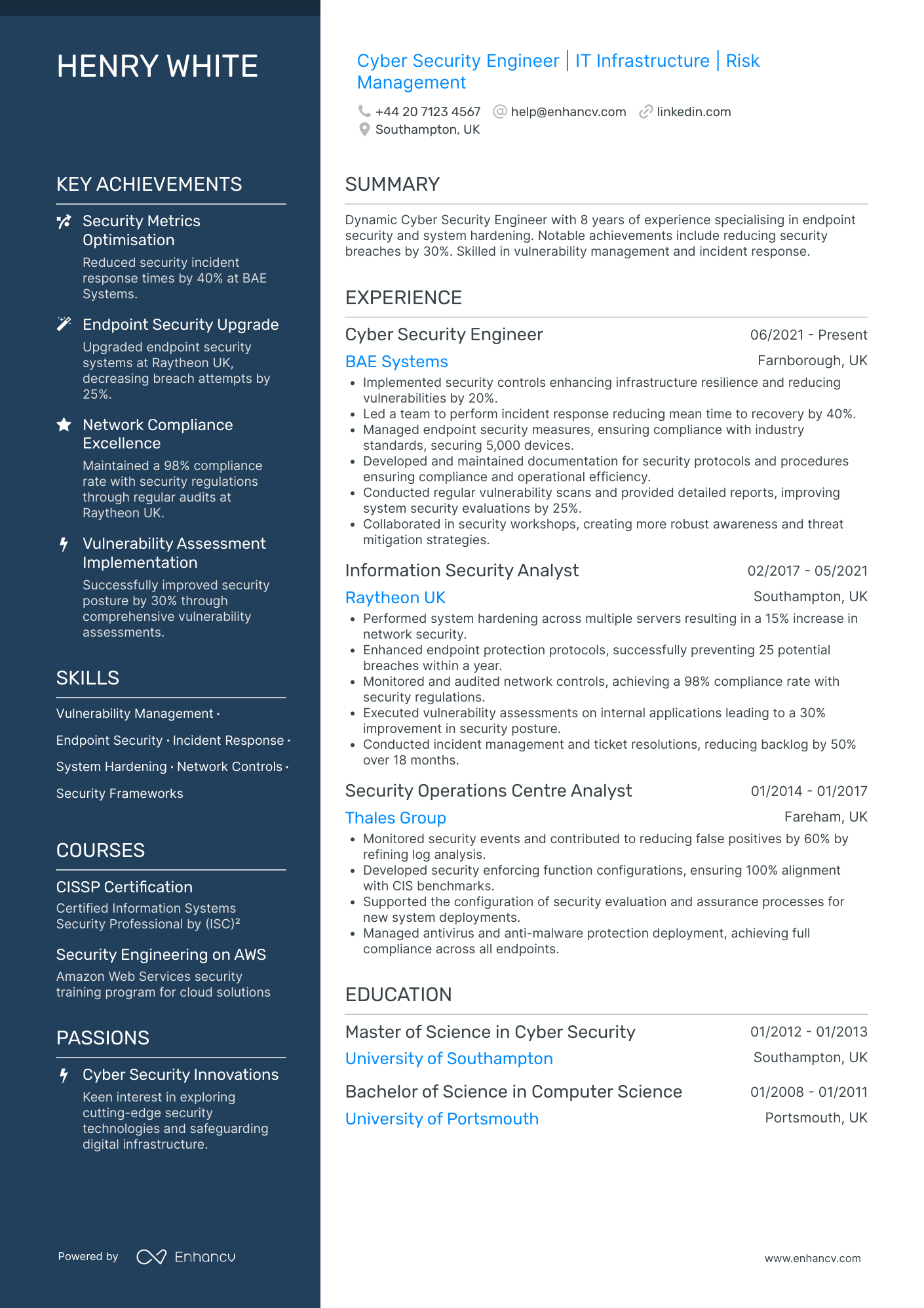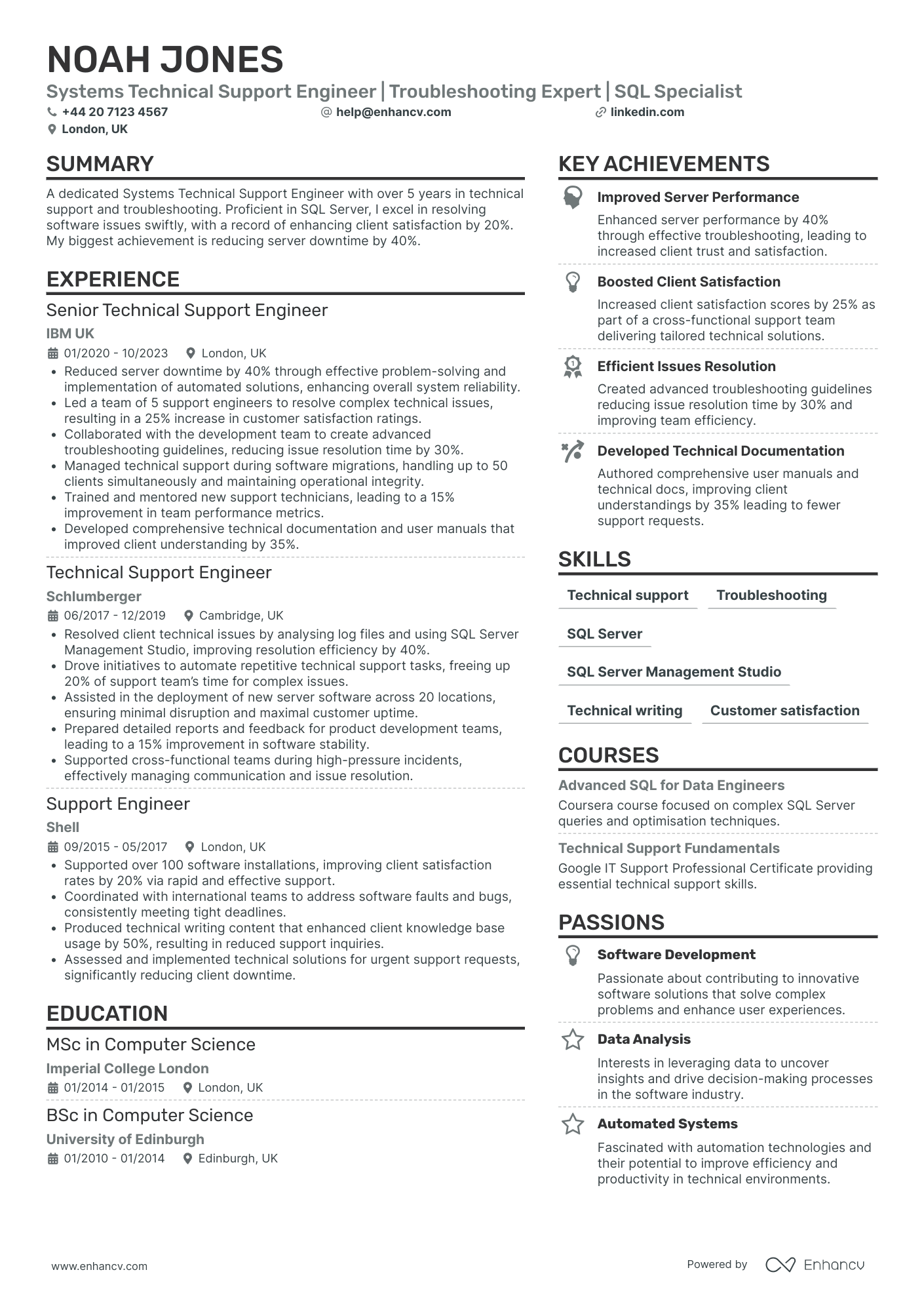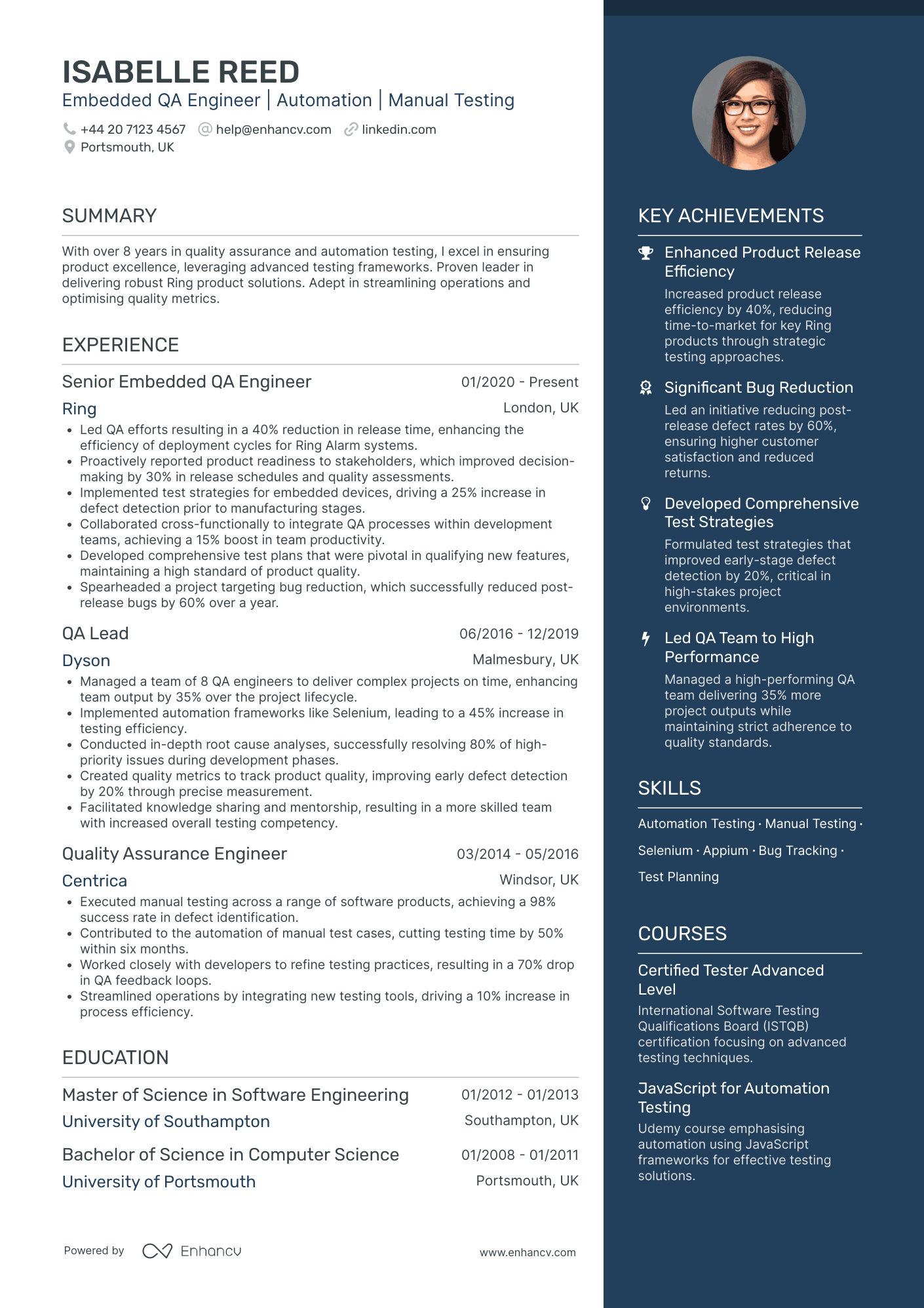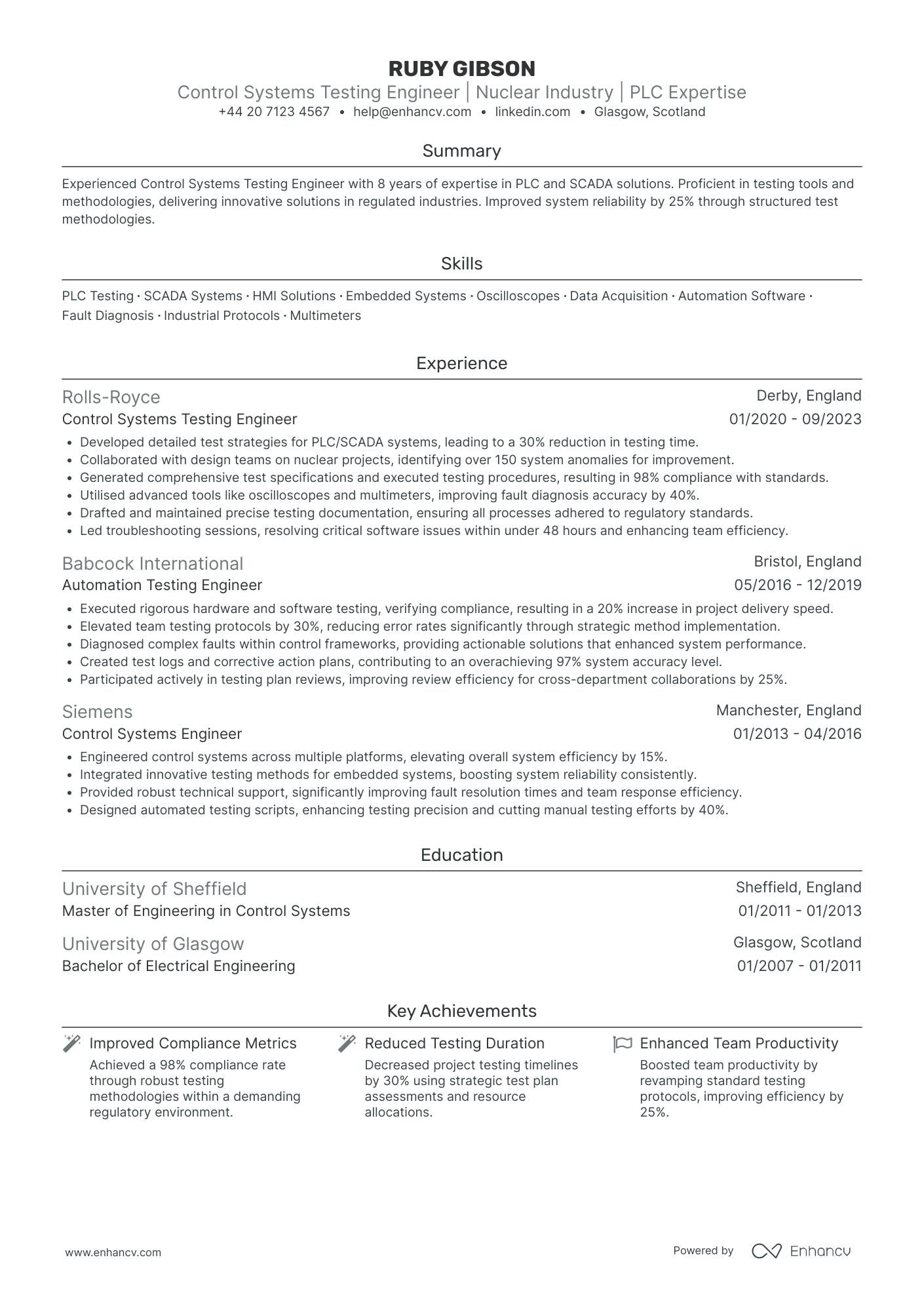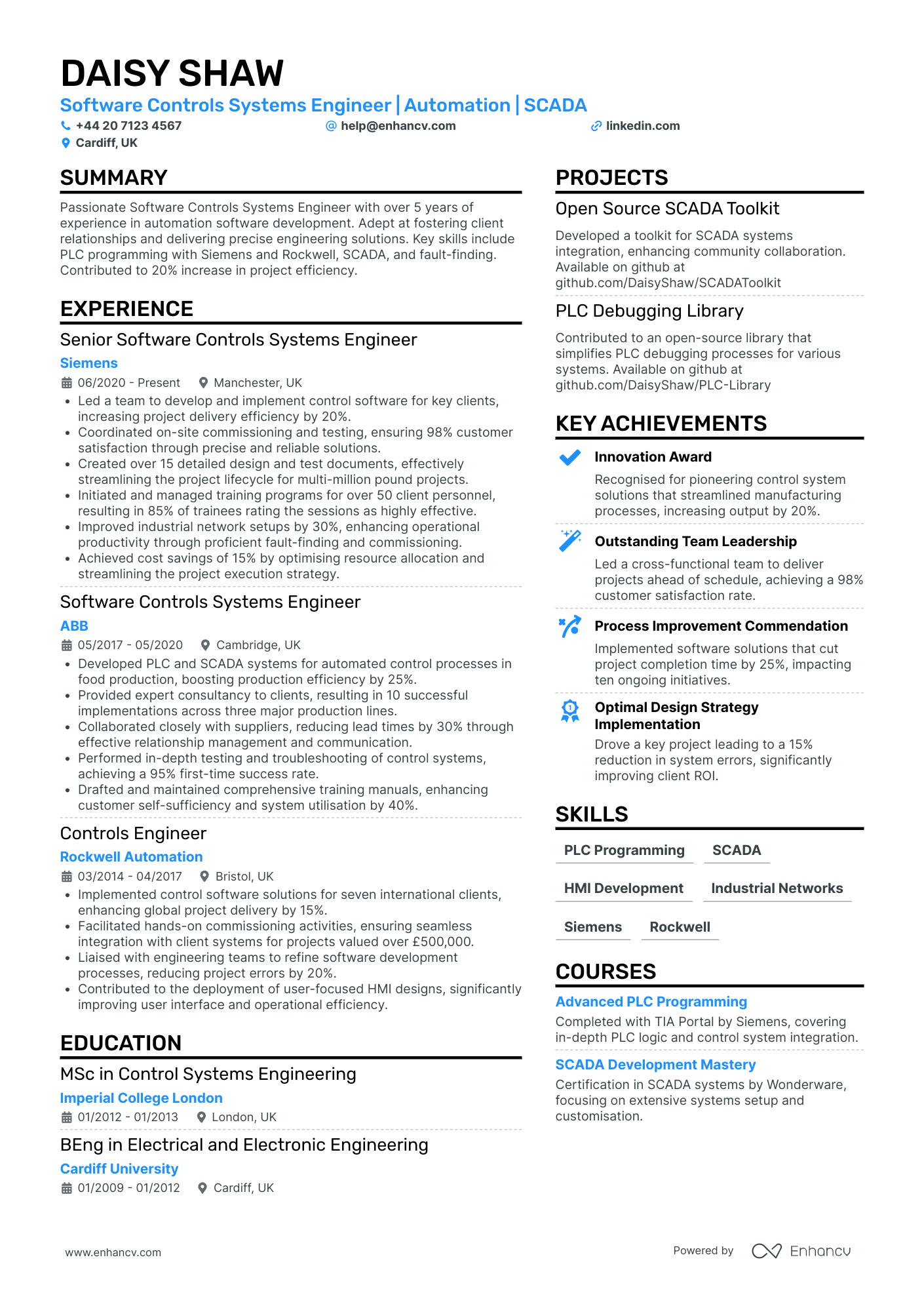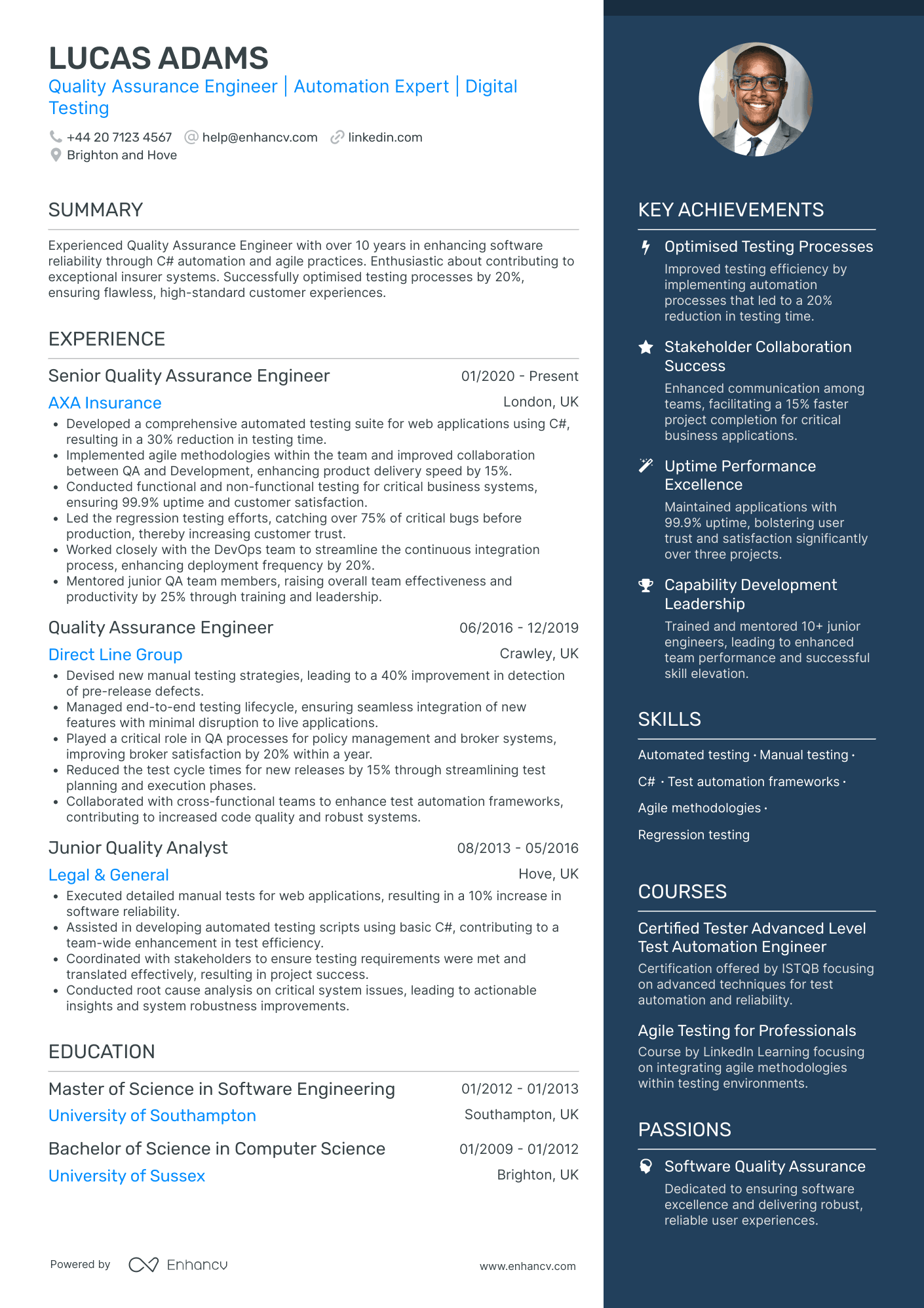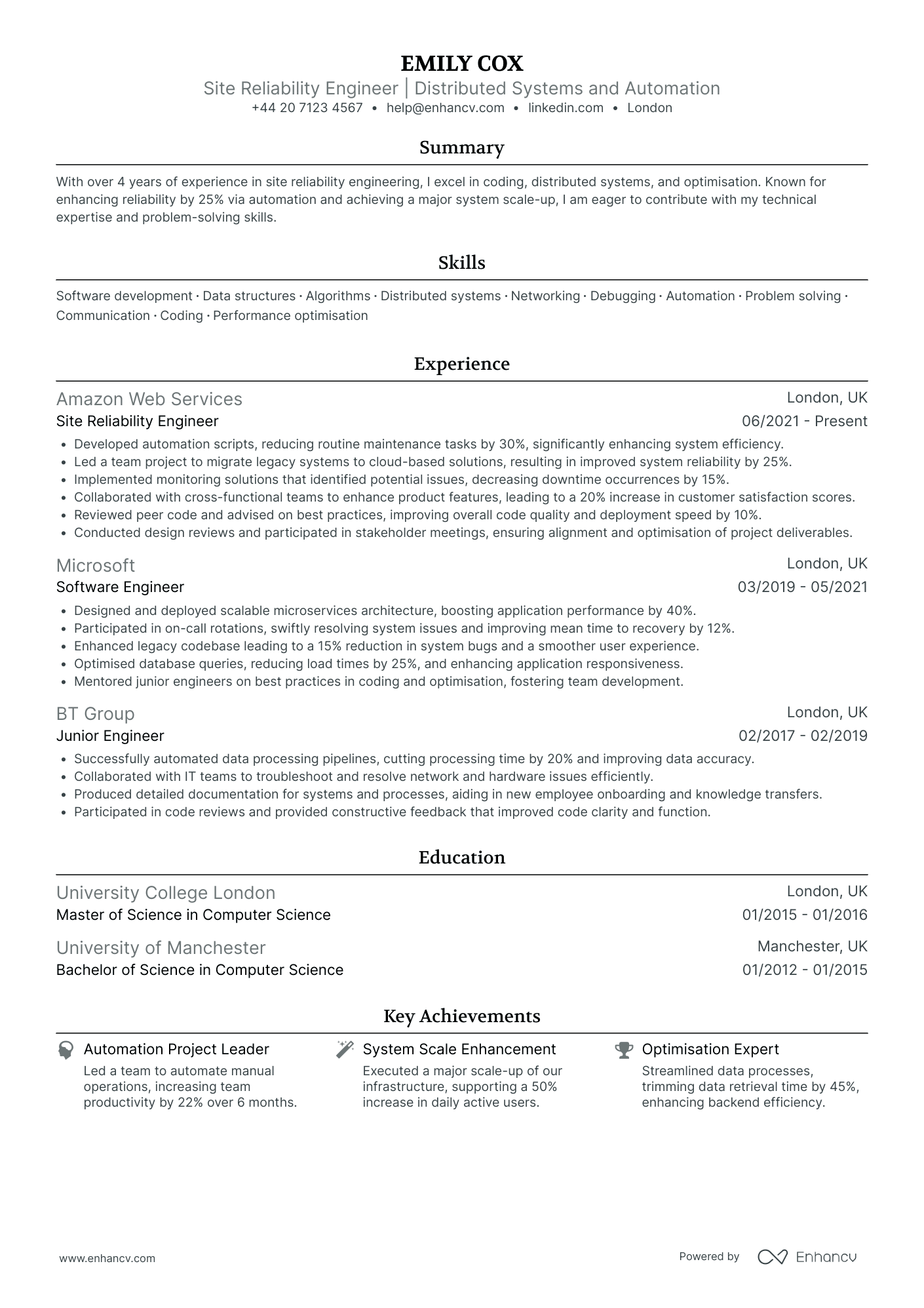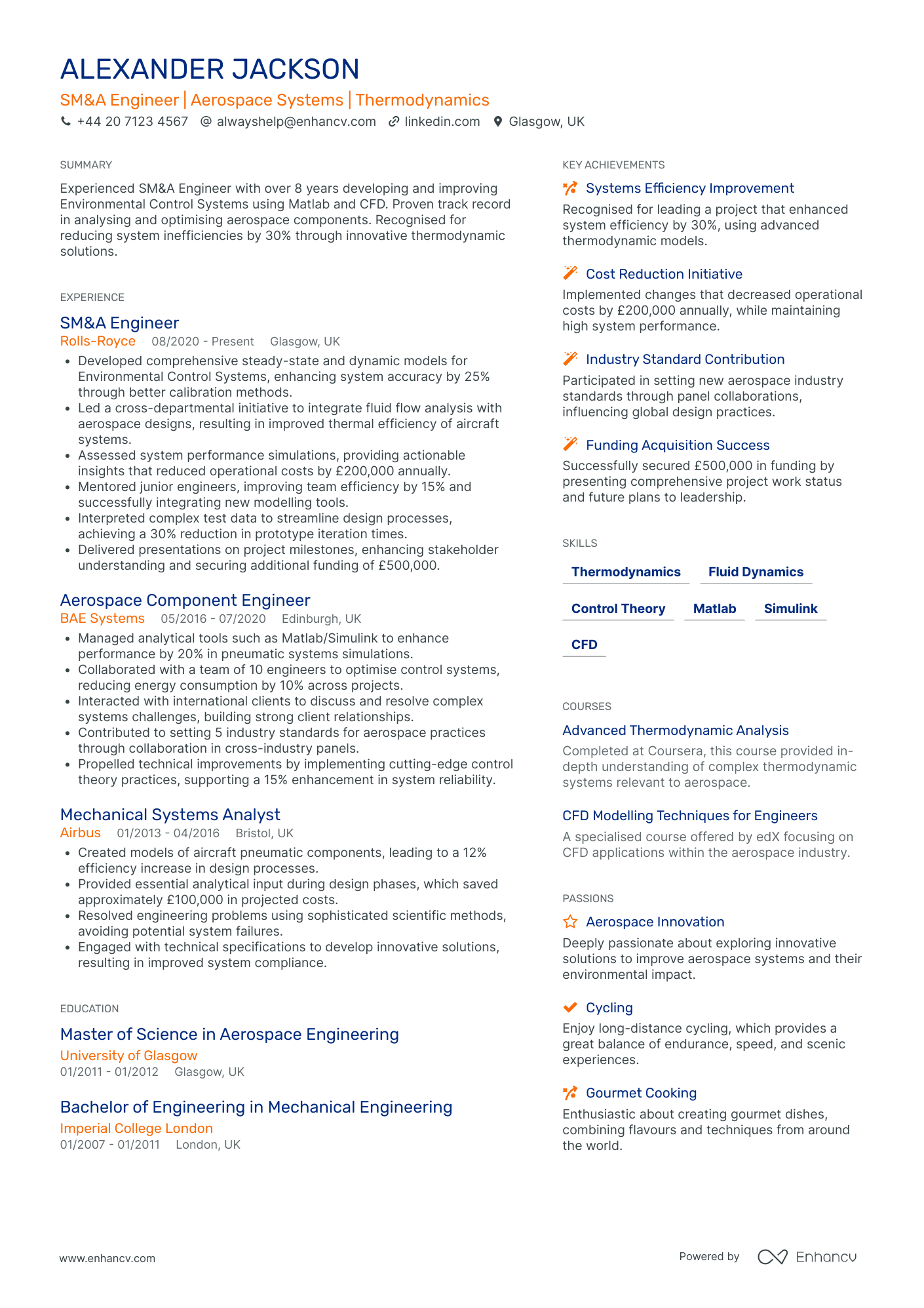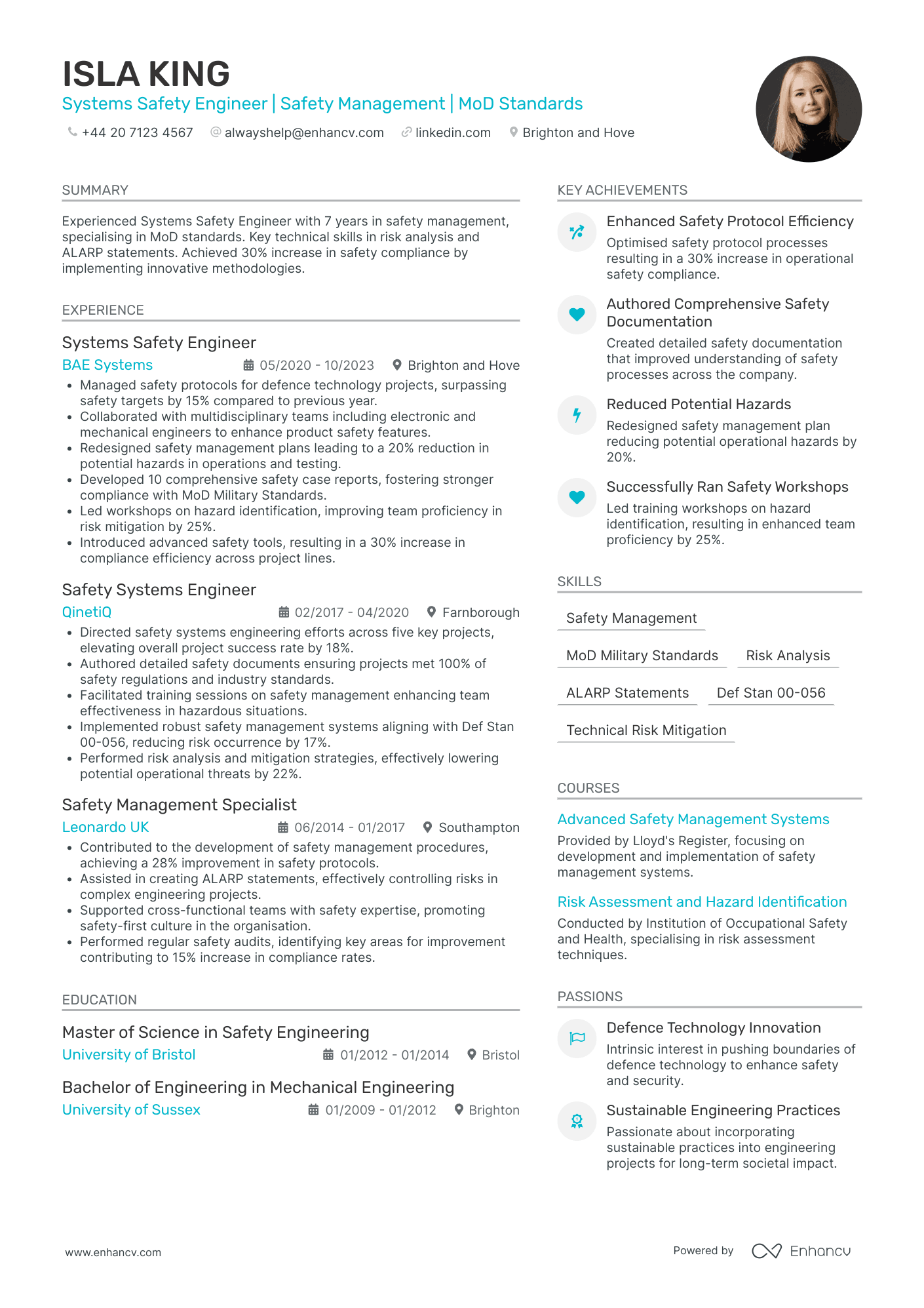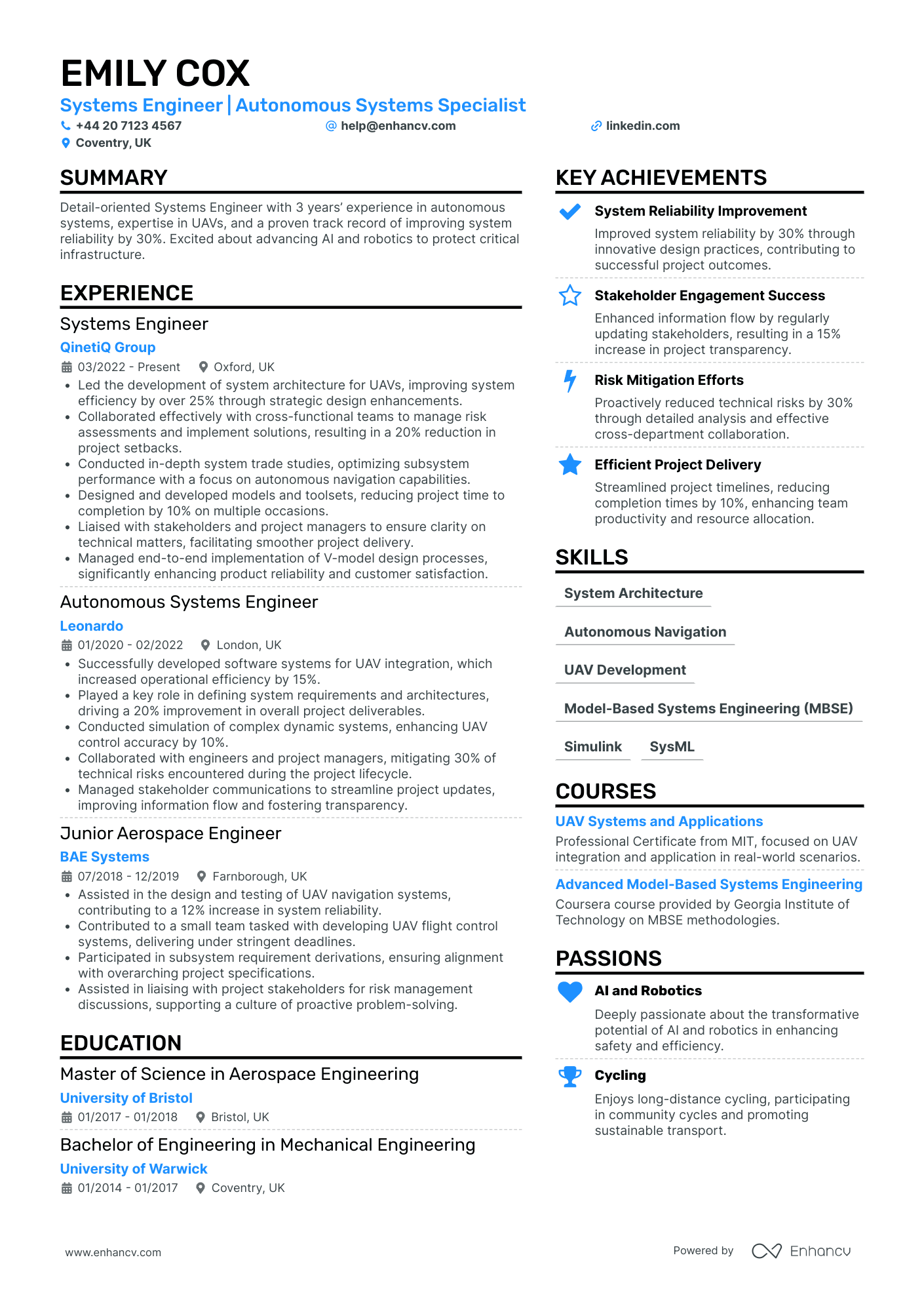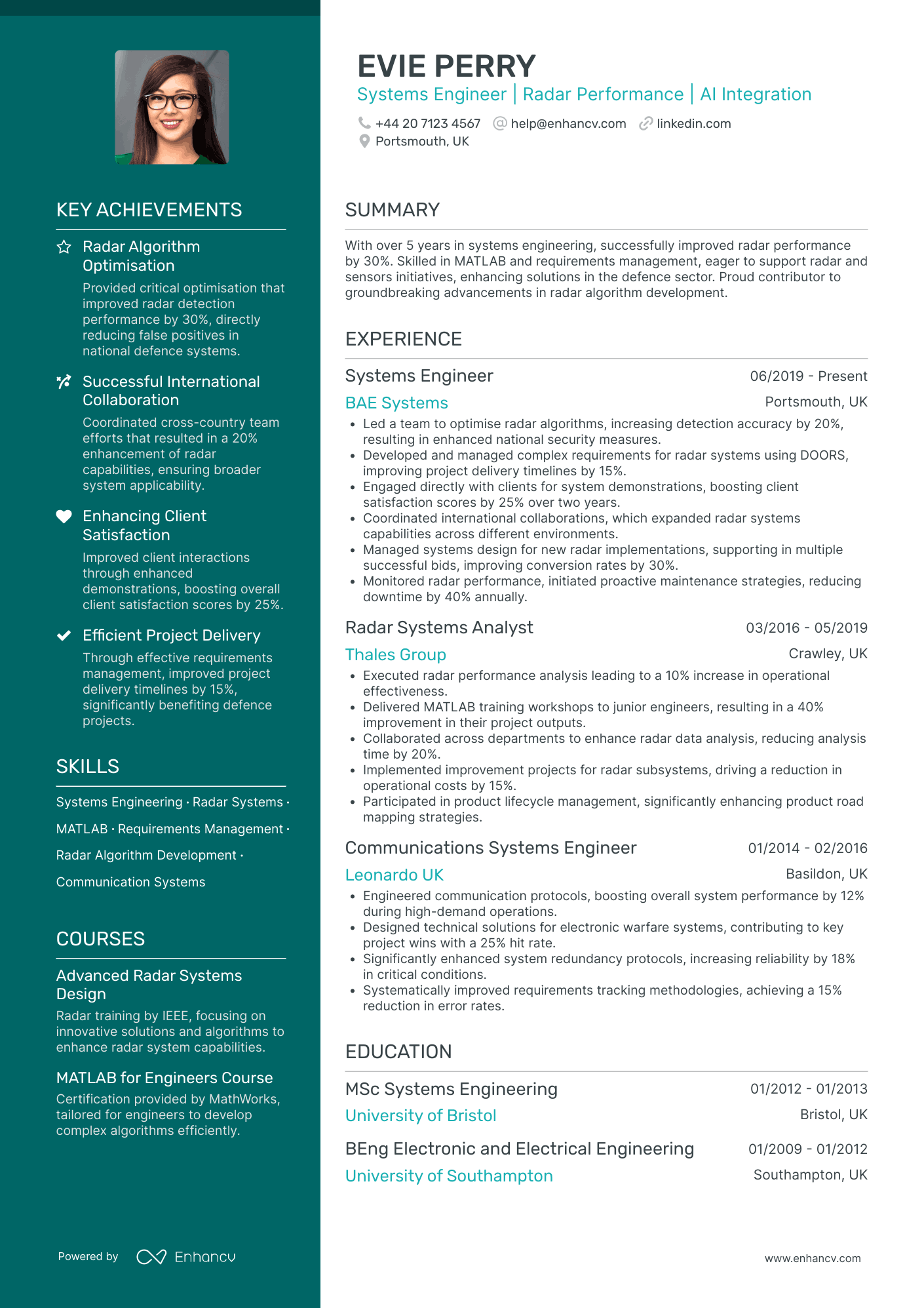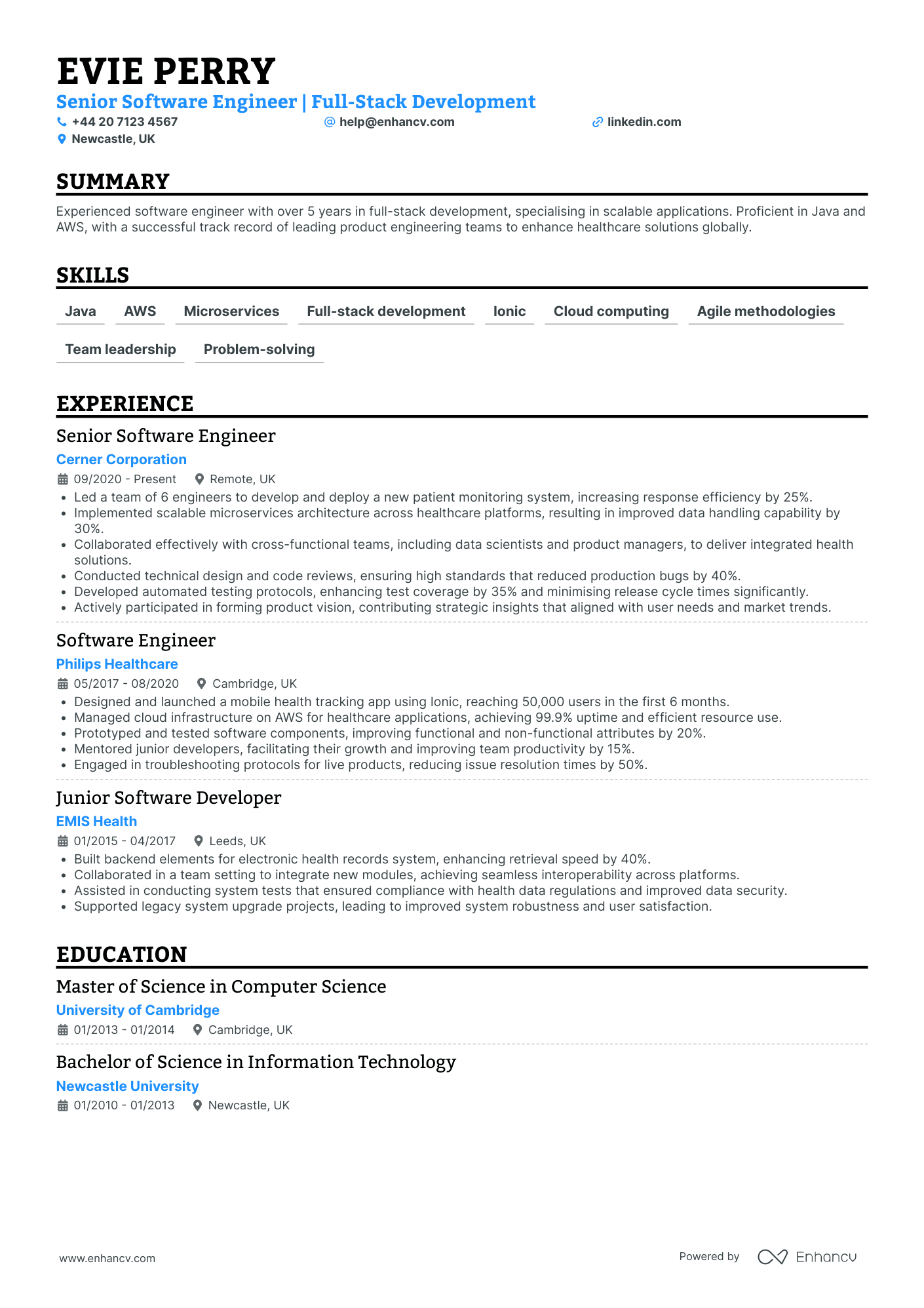Crafting a CV that effectively highlights the intricate balance of technical expertise and project management skills is a significant challenge for a systems engineer. Our guide provides tailored advice on structuring your achievements and demonstrating your unique value proposition to potential employers.
- Applying the simplest CV design, so that recruiters can easily understand your expertise, skills, and professional background;
- Ensuring you stand out with your header, summary or objective statement, and a designated skills section;
- Creating your CV experience section - no matter how much expertise you have;
- Using real life professional CV examples to enhance the structure and outline of your profile.
If you still have no muse to write your professional CV, find some more industry-leading examples.
Resume examples for systems engineer
By Experience
Junior Systems Engineer
- Clear and Structured Content Presentation - The CV is presented with clarity and organization, breaking down complex experiences and skills into concise, easy-to-understand bullet points that enhance readability. This structured approach makes it easy for hiring managers to quickly grasp key details about Ivy Ward's professional background.
- Career Trajectory Highlighting Growth within Engineering - Ivy Ward’s CV demonstrates a clear career progression from a Systems Engineering Intern to a Junior Systems Engineer. This upward trajectory showcases her increasing responsibilities and leadership capabilities within the engineering sector, reflecting her dedication and competence.
- Inclusion of Industry-Specific Methodologies and Tools - The CV emphasizes Ivy Ward's expertise in Model-Based Systems Engineering (MBSE) and systems engineering tools. This inclusion of specialized technical depth not only distinguishes her as a knowledgeable candidate in systems engineering but also aligns with industry needs in sustainable energy initiatives.
Lead Systems Engineer
- Engages with clear and structured content presentation - The CV leverages a well-organized structure that clearly presents personal details, career summary, experience, education, skills, courses, achievements, languages, and passions. This logical flow enhances readability and allows recruiters to quickly access key information.
- Demonstrates impressive career trajectory - James Lewis showcases a steady career progression from Systems Engineer at Rolls-Royce, advancing to Senior Systems Engineer at BAE Systems, and ultimately taking on the role of Principal Systems Engineer at Thales Group. This upward trajectory reflects both skill enhancement and increasing leadership responsibilities.
- Highlights industry-specific methodologies - The CV is rich in technical depth, highlighting expertise in the V-Model, systems engineering, and metrology. These industry-specific methodologies underscore James's capability to handle complex instrumentation and project lifecycle management effectively.
Principal Systems Engineer
- Concise and Structured Content Presentation - The CV is structured with clear, concise sections that deliver key information without excessive detail. Each role and achievement is outlined with bullet points, ensuring quick readability and easy reference, which is particularly useful for employers in technical fields who need to extract relevant data swiftly.
- Consistent Career Growth and Advancement - Arthur’s career trajectory demonstrates a consistent upward movement from a Systems Engineer to a Principal Systems Engineer. This progression, coupled with experience in renowned companies such as BAE Systems, Thales Group, and Rolls-Royce Naval, highlights not only his expertise but also his ability to adapt and excel in progressively senior roles within the maritime combat systems engineering domain.
- Proficiency in Industry-Specific Tools and Methodologies - The CV underscores Arthur’s expertise in IBM DOORS, a crucial tool for requirements management in systems engineering, which demonstrates his capability to handle complex projects. Additionally, his adeptness in the integration and qualification phases showcases his deep understanding of technical methodologies that are vital in maximizing system performance and efficiency.
By Role
Systems Integration Engineer
- Logical Presentation and Clarity - The CV is structured clearly, emphasizing important sections such as experience, education, and skills, which are presented in a concise manner. This allows for easy navigation and ensures that crucial details stand out, reinforcing the candidate's ability to communicate complex information efficiently.
- Career Growth in Aerospace and Engineering - Charlie Thomas' career trajectory showcases significant progression, moving from Systems Development Engineer roles at GKN Aerospace to a Senior Systems Engineer position at Rolls-Royce. This upward movement highlights an increasing level of responsibility and influence within the aerospace sector, underscoring his capability to adapt and thrive in complex environments.
- Mastery of Industry-Specific Tools - The CV highlights proficiency in IBM DOORS, a critical tool for requirements management in systems engineering. This expertise, combined with his deployment of V&V processes and knowledge of ARP4754 and ARP4761 standards, establishes a strong technical foundation that is highly relevant to systems development and innovation in aviation.
Systems Test Engineer
- Clear Content Presentation - The CV is well-structured and concise, presenting information in a clear manner that allows the reader to easily understand the candidate’s qualifications. The use of sections such as summary, experience, education, and skills helps organize the content efficiently, making it easy to navigate and extract critical information at a glance.
- Impressive Career Trajectory - Samuel’s career journey shows a clear progression from Systems Engineer to Senior Test Systems Engineer, demonstrating consistent growth and advancement in his field. This upward trajectory reflects not only his personal development but also his increasing responsibility and impact within the industry. His career moves across leading firms like BAE Systems and Rolls-Royce indicate valuable experience and industry knowledge.
- Integration of Industry-Specific Tools and Techniques - The CV emphasizes Samuel’s proficiency with industry-standard tools and methodologies such as Siemens Polarion, MATLAB, and agile processes. These technical competencies highlight his ability to employ the latest technologies and innovations in test systems engineering, setting him apart as a knowledgeable and capable professional in this sector.
Information Systems Engineer
- Strategic Career Progression - Ivy Ward's career trajectory demonstrates a calculated move from a Junior Systems Engineer to a Senior Systems Engineer, highlighting a clear path of professional growth and leadership. With each role, Ivy has expanded her skills from technical tasks to strategic team leadership at BAE Systems, which solidifies her experience in complex system integrations.
- Technical Proficiency in Advanced Methodologies - The CV is rich with industry-specific expertise, showcasing proficiency in Model Based Systems Engineering (MBSE) and the use of SysML, TOGAF, and NoMagic Cameo. Such technical depth in these methodologies underlines her capacity to handle high-stakes projects in the defense sector effectively.
- Impactful Achievements with Business Relevance - Ivy's accomplishments are described with a focus on their impact, such as a 30% increase in project delivery efficiency and a 20% improvement in design accuracy. These achievements not only confirm her technical prowess but also emphasize her contributions to organizational success, underscoring her effectiveness in project leadership and stakeholder management.
Systems Security Engineer
- Content is structured for readability and impact - The CV features clear headings and bullet points, making it easy to skim through the detailed professional journey of the candidate. Each section begins with strong titles and concise role descriptions, allowing the reader to quickly capture essential information without wading through large amounts of text.
- Career trajectory emphasizes continuous advancement and industry relevance - Henry’s career progression from Security Operations Centre Analyst to Cyber Security Engineer reflects significant personal and professional growth. This upward trajectory underscores his expanding expertise in cyber security, from foundational monitoring roles to leading infrastructure resilience and incident response teams.
- Achievements underscore substantial reductions and improvements - The candidate has numerous quantifiable achievements, such as reducing security breaches by 30% and improving system recovery times significantly, which demonstrate his ability to profoundly impact organizational security posture. These accomplishments highlight not just routine work but substantial contributions toward enhancing the overall operational security environment.
Systems Support Engineer
- Clear Career Progression and Growth - Noah Jones' CV effectively outlines a strong career trajectory from a Support Engineer at Shell to a Senior Technical Support Engineer at IBM UK. Each role demonstrates a significant increase in responsibilities and the acquisition of leadership skills, reflecting consistent professional growth and the ability to handle more complex technical challenges over time.
- Extensive Use of Automation and Technical Tools - The CV highlights experience with SQL Server and SQL Server Management Studio, showcasing a deep technical acumen crucial for a Systems Technical Support Engineer role. Jones’ ability to implement automated solutions further underscores their proficiency in using technology to enhance efficiency, such as freeing up 20% of support team’s time by automating repetitive tasks.
- Impactful Achievements with Business Relevance - Achievements in the CV are presented with clear metrics and business impact, like reducing server downtime by 40% and increasing client satisfaction by 25%. These accomplishments demonstrate not only technical expertise but also a strategic understanding of how technical support activities influence larger business outcomes, such as enhancing client trust and operational integrity.
Embedded Systems Engineer
- Structured and Concise Presentation - The CV is organized with clear headings and bullet points, enhancing readability and making it easy to navigate through various sections. The concise nature of the content ensures that the reader can quickly access key information without unnecessary verbosity.
- Consistent Career Growth in QA - Isabelle Reed demonstrates a strong career trajectory, moving from roles in manual testing to leading teams and implementing automation as a Senior Embedded QA Engineer. This progression highlights her expertise and commitment to advancing within the quality assurance domain.
- Robust Technical Proficiency - The CV provides specific examples of industry-specific tools and methodologies, such as implementing automation frameworks like Selenium and expertise in embedded systems. This technical depth is crucial for an Embedded QA Engineer and sets her apart from others.
Control Systems Engineer
- Structured and Comprehensive Presentation - Ruby Gibson's CV is well-organized, making it easy for readers to follow her career history and accomplishments. With clear headers and bullet points, the document presents detailed information succinctly, ensuring that each section, from education to experience, is accessible and logical.
- Impressive Career Growth and Consistency - Over the years, Ruby has shown remarkable growth within the nuclear industry, moving from roles in control systems engineering to becoming a testing engineer. Her consistent work in prominent companies like Siemens, Babcock International, and Rolls-Royce highlights a commitment to her field, underpinned by increasing responsibility and expertise.
- Use of Advanced Tools and Precise Methodologies - The CV demonstrates Ruby's proficiency in industry-specific tools such as oscilloscopes and multimeters, showcasing her ability to diagnose faults and enhance system reliability effectively. Her technical depth stands out, particularly in regulated environments, where compliance and testing precision are crucial.
Systems Software Engineer
- Structured career progression - Daisy Shaw’s CV traces a deliberate and upward career trajectory, culminating in a Senior Software Controls Systems Engineer position at Siemens. It demonstrates her growth from initial roles in controls engineering at Rockwell Automation to significant responsibilities at ABB and Siemens, reflecting a consistent advancement within the automation and control systems sector.
- Balance of technical and soft skills - The CV effectively combines Shaw’s technical prowess in PLC programming, SCADA, and fault-finding with her soft skills, evidenced by her leadership in client training programs and her role as a team leader. Her achievements in both areas underline her capability to deliver technical solutions while fostering strong interpersonal relationships.
- Impactful contributions and achievements - The document highlights specific achievements such as improving project efficiency by 20% and reducing project completion time by 25%, underscoring Shaw’s ability to deliver substantial impact. Her recognitions, like the Innovation Award and Outstanding Team Leadership, further validate her contributions to the industry and her expertise in delivering high-value outcomes.
Systems Quality Assurance Engineer
- Structured and Concise Presentation - The CV is well-organized, providing clear headers and delineated sections that make it easy to navigate through the applicant's experience, education, skills, and achievements. Each section is concise yet comprehensive, ensuring that the reader quickly grasps the essentials of Lucas Adams’ expertise and background.
- Robust Career Development - Lucas Adams demonstrates significant professional growth, moving from a Junior Quality Analyst to a Senior Quality Assurance Engineer. This progression highlights his capability to advance within the field, taking on increasingly complex roles and responsibilities, which indicates both reliability and ambition in his career pathway.
- Technical Proficiency and Innovations - The CV underscores Adams' deep understanding of industry-relevant tools and methodologies, such as the development of automated testing suites using C# and the application of agile methodologies. These highlight his technical depth and innovative approaches to enhancing QA processes, reinforcing his expertise in ensuring software quality and reliability.
Systems Reliability Engineer
- Concise and Organized Presentation - The CV is structured for clarity and brevity, effectively presenting key information in distinct sections such as experience, education, and skills. This allows for quick comprehension of qualifications and career highlights by potential employers.
- Notable Career Progression - Emily's career trajectory demonstrates consistent growth from a Junior Engineer to a Site Reliability Engineer at top-tier technology companies. This progression highlights her ability to adapt and excel in increasingly responsible roles.
- Technical Proficiency and Methodologies - The CV showcases Emily's deep technical expertise in distributed systems and automation, underscored by her experience with cloud-based solutions and microservices architecture. These skills align well with industry-specific demands for innovation and system resilience.
Systems Performance Engineer
- Strategic Leadership and Mentorship - Alexander Jackson's CV demonstrates significant leadership capabilities, particularly evident in his role as an SM&A Engineer at Rolls-Royce. Notably, he led a cross-departmental initiative that improved aircraft systems' thermal efficiency and mentored junior engineers, enhancing team efficiency by 15%. These experiences highlight his ability to lead projects and nurture talent simultaneously.
- Comprehensive Skill Set with Industry-Specific Tools - The CV showcases a robust array of technical skills essential for an SM&A Engineer, including Thermodynamics, Fluid Dynamics, and Control Theory. His proficiency in industry-standard software such as Matlab, Simulink, and CFD positions him as a technically well-rounded candidate capable of tackling complex engineering challenges within the aerospace sector.
- Proven Impact Through Quantifiable Achievements - Alexander clearly documents his career achievements with quantifiable results that demonstrate his impact within organizations. For instance, he successfully reduced system inefficiencies by 30% and saved £200,000 annually through his contributions. These figures underscore not only his technical expertise but also his capacity to deliver substantial business value.
Systems Safety Engineer
- Structured and Clear Presentation - The CV is organized meticulously, allowing for easy navigation through Isla King's experiences, skills, and achievements. Each section is clearly defined, with concise bullet points that efficiently convey key information, making it straightforward to grasp the applicant's qualifications and professional journey.
- Progressive Career Trajectory - Isla's career demonstrates a steady ascent in safety engineering within the defense sector, transitioning through roles at Leonardo UK, QinetiQ, and BAE Systems. Each position reflects an increase in responsibility and expertise, indicating her growing skill set and leadership abilities that align with industry standards and advancements.
- Accomplishments with Impact - The CV highlights Isla's significant contributions to the organizations she has worked for, with achievements such as increasing safety compliance by 30% and reducing potential hazards by 20%. These accomplishments are not only quantitative but also underscore her impact on enhancing safety systems and efficiency, reinforcing her value to prospective employers in the engineering domain.
Systems Development Engineer
- Clear Presentation and Structured Content - The CV is well-organized, starting with a concise summary that effectively introduces Emily Cox's expertise. Each section is clearly labeled, allowing the reader to easily navigate through her career achievements, educational background, and skills, which enhances the overall readability and impact.
- Impressive Career Growth and Sector Expertise - Emily's career trajectory illustrates steady growth and focus within the aerospace and autonomous systems industries. Moving from a Junior Aerospace Engineer to a Systems Engineer shows her capability to assume more responsibilities and demonstrates her commitment to advancing in her field, with a particular emphasis on UAVs and system reliability improvements.
- Specialized Skills and Industry Tools - The CV highlights Emily's proficiency in industry-specific methodologies like Model-Based Systems Engineering (MBSE) and technical tools such as Simulink and SysML. Her expertise in these areas is significant for roles specializing in systems engineering and autonomous systems, making her a strong candidate in her field.
Aviation Systems Engineer
- Strong career progression across leading companies - Evie Perry's career progression demonstrates a clear trajectory from a Communications Systems Engineer at Leonardo UK to a Systems Engineer at BAE Systems. This upward movement reflects not only her growing expertise but also her adaptability to transition smoothly across major players in the defence sector.
- Emphasis on technical depth with industry-specific tools - The CV highlights Evie's proficiency with specialized tools such as MATLAB and DOORS, crucial for radar and systems engineering. Her experience with these tools underlines her capability to manage complex algorithms and requirements, thereby ensuring efficient project execution within the technological nuances of her field.
- Illustrates impactful achievements with strategic relevance - Evie’s CV is peppered with specific achievements that go beyond numerical improvements, demonstrating her direct impact on business and national security. For instance, her work optimizing radar algorithms not only increased detection accuracy but also strengthened national security measures, presenting her contributions in a strategic context.
Biomedical Systems Engineer
- Strategic and Results-Oriented Leadership - Evie's CV showcases her ability to lead and develop high-performing engineering teams, as evidenced by her role at Cerner Corporation where she led a team to enhance a patient monitoring system, resulting in a significant 25% improvement in response efficiency. Her leadership skills are further emphasized by her role in executing strategic insights that align with user needs and market trends.
- Diverse Technical Skillset with Industry-Relevant Tools - This CV highlights Evie's strong command of both back-end and front-end development, with proficiency in Java, AWS, and microservices architecture. Working in healthcare technology, she has applied her technical skills to design scalable applications, optimize cloud infrastructure, and manage full-stack development projects, which are crucial competencies in today's tech-driven healthcare solutions.
- Clear Alignment with Role-Specific Expertise - Evie’s CV structure concisely presents her educational background, software engineering experience, technological expertise, and achievements, all of which directly relate to her targeted role as a Senior Software Engineer in full-stack development. Each section is succinct yet impactful, emphasizing her suitability for advancing innovative healthcare technology solutions.
How complex should the format of your systems engineer CV be?
Perhaps, you decided to use a fancy font and plenty of colours to ensure your systems engineer CV stands out amongst the pile of other candidate profiles. Alas - this may confuse recruiters. By keeping your format simple and organising your information coherently, you'll ultimately make a better impression. What matters most is your experience, while your CV format should act as complementary thing by:
- Presenting the information in a reverse chronological order with the most recent of your jobs first. This is done so that your career history stays organised and is aligned to the role;
- Making it easy for recruiters to get in touch with you by including your contact details in the CV header. Regarding the design of your CV header, include plenty of white space and icons to draw attention to your information. If you're applying for roles in the UK, don't include a photo, as this is considered a bad practice;
- Organising your most important CV sections with consistent colours, plenty of white space, and appropriate margins (2.54 cm). Remember that your CV design should always aim at legibility and to spotlight your key information;
- Writing no more than two pages of your relevant experience. For candidates who are just starting out in the field, we recommend to have an one-page CV.
One more thing about your CV format - you may be worried if your double column CV is Applicant Tracker System (ATS) complaint. In our recent study, we discovered that both single and double-column CVs are ATS-friendly . Most ATSes out there can also read all serif and sans serif fonts. We suggest you go with modern, yet simple, fonts (e.g. Rubik, Lato, Raleway) instead of the classic Times New Roman. You'll want your application to stand out, and many candidates still go for the classics. Finally, you'll have to export your CV. If you're wondering if you should select Doc or PDF, we always advise going with PDF. Your CV in PDF will stay intact and opens easily on every OS, including Mac OS.
PRO TIP
Be mindful of white space; too much can make the CV look sparse, too little can make it look cluttered. Strive for a balance that makes the document easy on the eyes.
The top sections on a systems engineer CV
- Professional Summary highlights expertise in systems engineering, reflecting the candidate's abilities and accomplishments.
- Technical Skills section showcases specific systems engineering tools, languages, and methodologies the applicant is proficient in.
- Work Experience details the roles and projects relevant to systems engineering, emphasising leadership and technical achievements.
- Relevant Education lists degrees or certifications pertinent to systems engineering, ensuring the candidate's formal training is visible.
- Projects and Achievements emphasizes notable contributions to systems engineering projects, underscoring real-world experience and success.
What recruiters value on your CV:
- Emphasise your understanding of the entire system architecture by detailing your experience with systems integration, operations, and maintenance, as well as your ability to ensure all components work harmoniously.
- Highlight specific technical proficiencies in systems engineering software and tools, such as MATLAB, Simulink or enterprise architecture frameworks, that are relevant to the position you’re applying for.
- Include any successful projects where you've implemented systems engineering methodologies such as requirements engineering, trade studies, and model-based systems engineering to demonstrate your practical application of theoretical knowledge.
- Showcase your problem-solving skills by detailing complex systems challenges you've encountered and how you've overcome them, illustrating your methodical and analytical approach.
- Mention any professional certifications, such as INCOSE CSEP or ESEP, or relevant training that prove your commitment to continuing professional development within systems engineering.
Recommended reads:
Tips and tricks on writing a job-winning systems engineer CV header
The CV header is the space which most recruiters would be referring most often to, in the beginning and end of your application. That is as the CV header includes your contact details, but also a headline and a professional photo. When writing your CV header:
- Double-check your contact details for spelling errors or if you've missed any digits. Also, ensure you've provided your personal details, and not your current work email or telephone number;
- Include your location in the form of the city and country you live in. If you want to be more detailed, you can list your full address to show proximity to your potential work place;
- Don't include your CV photo, if you're applying for roles in the UK or US, as this may bias initial recruiters' assessments;
- Write a professional headline that either integrates the job title, some relevant industry keywords, or your most noteworthy achievement.
In the next part of our guide, we'll provide you with professional CVs that showcase some of the best practices when it comes to writing your headline.
Examples of good CV headlines for systems engineer:
- Systems Engineer | Cloud Solutions Architect | AWS Certified | Agile Methodologies | 10+ Years Experience
- Senior Systems Engineer | DevOps Specialist | CI/CD Integration | Cybersecurity Focus | ITIL Certified | 15 Years Expertise
- Junior Systems Engineer | Network Design Graduate | Cisco CCNA | Virtualisation Technologies | 2 Years in Industry
- Systems Engineering Lead | Infrastructure Management | Systems Automation | Prince2 Practitioner | 12 Years Professional Track Record
- Associate Systems Engineer | Embedded Systems Developer | Robotics Enthusiast | BEng Honours | 3 Years Hands-On Experience
- Advanced Systems Engineer | Enterprise Software Integration | Data Analysis & Modelling | Masters in Systems Engineering | 8 Years Field Experience
What's the difference between a systems engineer CV summary and objective
Why should it matter to you?
- Your systems engineer CV summary is a showcasing your career ambitions and your unique value. Use the objective to answer why your potential employers should hire you based on goals and ambitions. The objective is the ideal choice for candidates who happen to have less professional experience, but still meet some of the job requirements.
Before you select which one will be more relevant to your experience, have a look at some industry-leading CV summaries and objectives.
CV summaries for a systems engineer job:
- Seasoned Systems Engineer with 12 years of robust experience in aerospace systems design and integration at BAE Systems. Expert in sophisticated avionics, with a significant accomplishment in leading the development of a state-of-the-art navigation system that resulted in a 30% increase in flight efficiency.
- Dedicated professional with 8 years in IT infrastructure management pivoting to Systems Engineering at Airbus. Mastered complex network configurations and data centre optimisations, achieving a record 99.98% system uptime last year, which surpassed the industry standard.
- Driven individual with over a decade of experience in developing advanced propulsion systems at Rolls-Royce, keen to apply unique expertise to space industry challenges. Instrumental in designing a groundbreaking eco-friendly engine that reduced emissions by 40% in test flights.
- Software Developer with a flair for algorithm optimisation transitioning to Systems Engineering, eager to transfer analytical skills to enhance system functionalities. Recognised for crafting a machine learning tool that improved data processing speeds by 150% at Tech Innovations Ltd.
- Aiming to leverage a strong foundation in mechanical engineering principles and a recent MSc in Systems Engineering to contribute fresh perspectives to complex projects. Eager to embrace the challenges of ensuring seamless systems integration and operations in the engineering sector.
- Aspiring Systems Engineer with a passion for technology and problem-solving, seeking to develop a career in systems design and analysis. With a background in computer science and cybernetics, keen to apply theoretical knowledge and innovative thinking to practical engineering solutions.
How to meet job requirements with your systems engineer CV experience
We've now reached the essence of your actual CV - your experience section. This is the space where you can list your career roles and on-the-job successes. Many candidates tend to underestimate just how much time and effort they should put into writing this CV section. Your experience shouldn't be a random list of your responsibilities, but instead:
- Match the job description with your skills, values, and accomplishments;
- Start each bullet with a strong action verb, followed up with one key skill and your outcome of applying this skill;
- Spotlight parts of your career history that are relevant to the job you're applying for.
Before we move on, make sure to check out some professional CV experience sections.
Best practices for your CV's work experience section
- Designed, implemented, and maintained scalable, high-availability systems, ensuring 99.9% uptime and significantly boosting business operations efficiency.
- Led a cross-functional team in a large-scale migration of on-premises data centre to cloud-based infrastructure, reducing costs by 30% and increasing agility.
- Developed custom automation scripts in Python and PowerShell, streamlining deployment processes and reducing manual intervention by 60%.
- Managed the lifecycle of over 500 virtual machines using VMware and Hyper-V, including provisioning, monitoring, and performance tuning.
- Implemented robust disaster recovery and business continuity plans, conducting regular drills that resulted in a 50% reduction in potential data loss exposure.
- Documented system configuration and architecture, creating detailed guidelines that improved knowledge transfer and onboarding of new staff.
- Collaborated with cybersecurity teams to harden systems against threats, leading to a 40% decrease in vulnerability exploits year-over-year.
- Analysed system bottlenecks and implemented optimisation strategies, which lead to a 25% improvement in system response times and user satisfaction.
- Contributed to the selection and procurement of IT hardware and software, ensuring alignment with strategic goals and cost-effectiveness.
- Led the design and implementation of a new real-time data processing platform, enhancing system throughput by 250%.
- Orchestrated the migration of legacy systems to cloud-based infrastructure, reducing operational costs by 20% and improving scalability.
- Conducted comprehensive system audits, identifying and rectifying 150+ potential security vulnerabilities, bolstering overall system integrity.
- Developed and optimised network performance monitoring tools, yielding a 30% decrease in downtime.
- Collaborated on the rollout of a company-wide ERP system, leading to improved operational efficiency and a 15% reduction in process cycle time.
- Provided mentorship to a team of junior engineers, improving team productivity by 35%.
- Coordinated the successful integration of cross-functional software systems for a major telecommunications project, streamlining data flow and improving customer experience.
- Spearheaded the development of a robust backup and disaster recovery plan, ensuring 99.99% system availability.
- Managed vendor relations and successfully negotiated contracts resulting in a 10% cost saving on software licenses.
- Led the deployment of infrastructure automation, reducing manual provisioning time by 40%.
- Initiated a cross-departmental collaboration to create unified APIs, significantly improving inter-system communication and reducing data silos.
- Authored technical documentation and standard operating procedures, which became the template for future projects.
- Developed a customised monitoring solution for server performance that was adopted by the entire IT department.
- Managed the complete lifecycle of a critical software deployment project, meeting all milestones ahead of schedule.
- Pioneered a proof-of-concept for network segmentation that substantially increased security posture.
- Mapped out and improved business processes using systems analysis, boosting overall productivity by 25%.
- Directed a team in implementing a new inventory management system that cut inventory carrying costs by 18%.
- Played a key role in a cross-functional team that designed a custom CRM solution, enhancing sales tracking and customer engagement.
- Implemented an automated code deployment system that reduced deployment errors by 60%.
- Established a collaborative culture applying DevOps practices, which reduced the time-to-market for new product features by 20%.
- Championed the use of machine learning for predictive maintenance within the systems infrastructure, decreasing unscheduled maintenance instances by 25%.
- Engineered a scalable server architecture to support a 300% surge in user activity for an online platform.
- Facilitated a 50% increase in system processing efficiency by refining algorithmic models in collaboration with the software engineering team.
- Initiated and led a cross-functional team to standardise the IT infrastructure, significantly reducing complexity and maintenance costs.
What to add in your systems engineer CV experience section with no professional experience
If you don't have the standard nine-to-five professional experience, yet are still keen on applying for the job, here's what you can do:
- List any internships, part-time roles, volunteer experience, or basically any work you've done that meets the job requirements and is in the same industry;
- Showcase any project you've done in your free time (even if you completed them with family and friends) that will hint at your experience and skill set;
- Replace the standard, CV experience section with a strengths or achievements one. This will help you spotlight your transferrable skills that apply to the role.
Recommended reads:
PRO TIP
Talk about any positive changes you helped bring about in your previous jobs, like improving a process or helping increase efficiency.
Hard skills and soft skills to showcase your unique skill set on your systems engineer CV
Did you know that your CV will mostly likely be assessed by recruiters based on skill alignment? And that means that the way you feature your key skills across different CV sections will play a crucial role in landing you that first interview. We recommend you add your:
- technical capabilities or hard skills in your CV experience, certificates, projects, etc. Use your past accomplishments to prove your technical capabilities. List up to a dozen different software or hardware in your dedicated skills section to match the job keywords;
- personal and communication skills or soft skills in your CV strengths, achievements, summary/ objective, etc. Soft skills are a bit more difficult to prove. How do you define your aptitude in active listening? So, instead of just listing the skill name, include a tangible metric to show your success.
On a final note, when you're in a hurry to create your profile, you may misspell a particular technology or soft skill. That's why we suggest you copy and paste the particular skill name (or keyword), directly from the job advert. This would also help you to pass any initial Applicant Tracker System (ATS) tests.
Top skills for your systems engineer CV:
Systems analysis and design
Knowledge of operating systems (Windows, Linux, macOS)
Experience with virtualisation technologies (VMware, Hyper-V)
Understanding of network infrastructure (TCP/IP, LAN/WAN)
Proficiency in programming/scripting languages (Python, Bash, PowerShell)
Familiarity with database management (SQL, NoSQL)
Experience with cloud services (AWS, Azure, Google Cloud)
Configuration management tools (Ansible, Puppet, Chef)
Version control systems (Git, SVN)
Performance monitoring and troubleshooting
Problem-solving
Critical thinking
Teamwork
Effective communication
Time management
Adaptability
Attention to detail
Project management
Continuous learning
Stakeholder engagement
PRO TIP
If there's a noticeable gap in your skillset for the role you're applying for, mention any steps you're taking to acquire these skills, such as online courses or self-study.
Listing your university education and certificates on your systems engineer CV
The best proof of your technical capabilities would be your education and certifications sections. Your education should list all of your relevant university degrees, followed up by their start and completion dates. Make sure to also include the name of the university/-ies you graduated from. If you happen to have less professional experience (or you deem it would be impressive and relevant to your application), spotlight in the education section:
- that you were awarded a "First" degree;
- industry-specific coursework and projects;
- extracurricular clubs, societies, and activities.
When selecting your certificates, first ask yourself how applicable they'd be to the role. Ater your initial assessment, write the certificate and institution name. Don't miss out on including the completion date. In the below panel, we've curated relevant examples of industry-leading certificates.
PRO TIP
If you have received professional endorsements or recommendations for certain skills, especially on platforms like LinkedIn, mention these to add credibility.
Recommended reads:
Key takeaways
Your successful job application depends on how you well you have aligned your systems engineer CV to the job description and portrayed your best skills and traits. Make sure to:
- Select your CV format, so that it ensures your experience is easy to read and understand;
- Include your professional contact details and a link to your portfolio, so that recruiters can easily get in touch with you and preview your work;
- Write a CV summary if you happen to have more relevant professional experience. Meanwhile, use the objective to showcase your career dreams and ambitions;
- In your CV experience section bullets, back up your individual skills and responsibilities with tangible achievements;
- Have a healthy balance between hard and soft skills to answer the job requirements and hint at your unique professional value.


